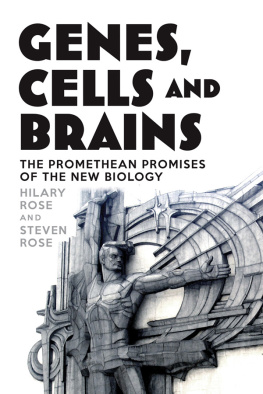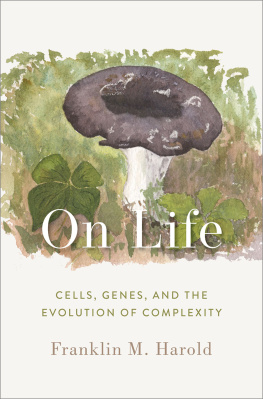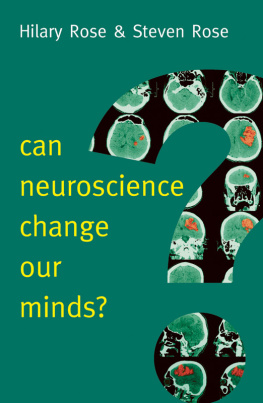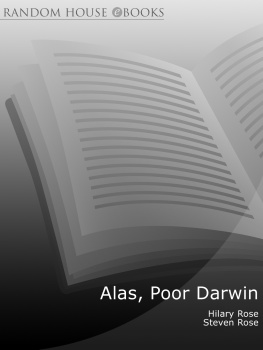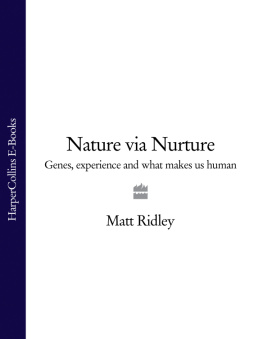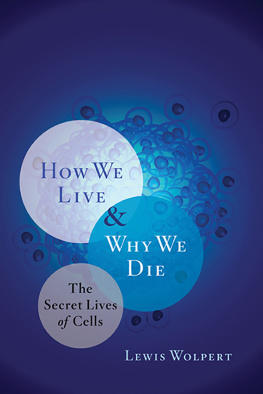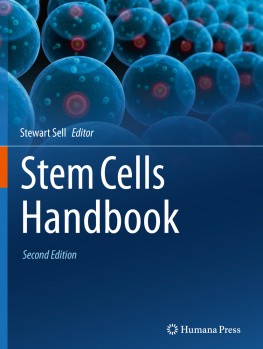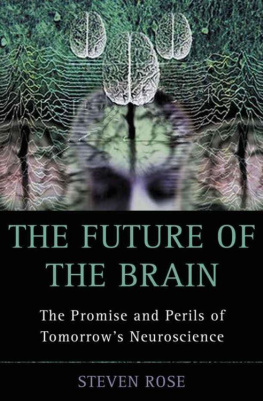
GENES, CELLS AND BRAINS
THE PROMETHEAN PROMISES OF THE NEW BIOLOGY
HILARY ROSE AND STEVEN ROSE

For our grandchildren: Sara, Chloe,
Nathaniel, Saul, Cosmo and Mali
Contents
In the Greek myth, Prometheus was the Titan who both created the first person from clay and gave humanity the fire he stole from the Gods. His punishment was to be tied to a stake, his liver devoured by an eagle during the day, only to be regrown at night. Mary Shelley drew on this myth, calling Victor Frankenstein, the creator of her monster, The Modern Prometheus ; her Prometheus, however, was no longer a god, but a scientist. But why was Frankenstein disgusted, fleeing from the very being he created? He had set out with noble intentions, using the new science of electricity to fashion life from dead tissue. As he explains: In a fit of enthusiastic madness I created a rational creature, and was bound to him to assure, as far as was in my power, his happiness and well-being. The monster tells Frankenstein the cost of rejection, of his denial of love and refusal to take moral responsibility for the monster he has created: There is love in me the likes of which youve never seen. There is rage in me the likes of which should never escape. If I am not satisfied in the one, I will indulge the other.
The Promethean claims of todays fusion of biomedicine and biotechnology to explain, mend, manipulate and transform the lives of the wealthy global minority are becoming ever louder. Indeed, they have already become part and parcel of everyday assumptions and discourse. Evolutionary theory offers to explain human origins, genomics to define similarity and difference, genetic and stem cell therapies to cure or prevent disease and even enhance bodies and minds, the neurosciences to predict behaviour, to explain consciousness and, with brain organisation theory, to re-essentialise sex gender difference. Genetics, this time with benign intent if not with benign consequences, has sought to re-racialise human difference.
In the process the life sciences have been transformed into gigantic biotechnosciences, blurring the boundaries between science and technology, universities, entrepreneurial biotech companies and the major pharmaceutical companies, or Big Pharma. Knowledge becomes intellectual property. The technosciences take place within and as part of a globalised economy, made possible by digitalisation, and stretching from the older scientific centres of Euro-America to the rising eastern giants of China, Singapore and India. The major players in these changes have been Big Pharma itself, venture capital, biotech companies, the state with its interests in surveillance and control, and, as usual, the military. In their train have come new and formidable powers not only to reconstruct but to construct life itself. The human cancer-bearing Oncomouse produced by Harvard biologists has become the icon of the reconfiguration of those seemingly fixed boundaries between culture and nature. DuPont holds the patent on this living creature, but Oncomouse is neither just nature nor just culture; only the neologism of culture/nature does justice to the technosciences of life in the twenty-first century, a brave new world, where life is both made and born.
In the chapters that follow, we trace the unfolding narratives of the biotechnosciences of genomics, regenerative medicine and the neurosciences or, as in our title, Genes, Cells and Brains locating them within the global neoliberal economy and culture of the twenty-first century. Genomics begins with the most ambitious and costly project in the history of the life sciences, the sequencing of the DNA of the human genome. Even as the international Human Genome Project began in the 1990s, plans were being laid for the creation of massive DNA databanks, intended to link the health records of entire populations with their DNA, to identify disease genes and develop personalised medicine. Hopes that this would lead to breakthroughs in the form of new drugs foundered on the gene sequencers failure to recognise the sheer complexity of humans as biosocial creatures, shaped by both evolutionary and social history. Nor has it been easy for genomics to transcend its own history, above all its inextricable links with eugenics. As genetic hopes diminished, a new prospect emerged: the almost magical potential for human embryonic stem cells to enable the lame to walk and the blind to see. And after stem cells has come the promise of the neurosciences as therapy to cure ill and disordered minds and as culture to construct human identity. From GenesRus to NeuronsRus in two decades.
This is new territory, with new threats and promises. Our own generation grew up in the boom years of full employment and the security provided by the welfare state, but also under the shadow of the Bomb. Back then, the possibility of nuclear war whose genetic effects, assuming we were spared total annihilation, would stretch down through the generations gave a sense of precarity to this apparently secure everyday life.
The tumultuous year of 1956 saw both Khrushchevs secret speech denouncing Stalinism and the Soviet invasion of Hungary, which together triggered the greatest crisis in Western communism; in Britain alone, ten thousand members left the Party. In that same year came the Suez crisis: Britain and France, the old imperialist powers, in collusion with Israel as the last of the white colonisers, invaded Egypt. They had badly miscalculated the public reaction. In Britain there was an immediate and outraged response not just from the left, the trade unions and the churches even the right wing of the Labour Party came out in opposition. Out of this ferment was born a New Left searching for a new kind of politics. New Left Clubs sprang up as places to debate ideas, rather than expound the correct line. The same willingness to experiment saw the New Left develop an alliance with the pacifists, out of which grew the Campaign for Nuclear Disarmament (CND) the first of the new social movements.
It was as part of this new movement, with its debates, demonstrations and marches, that we (the authors) first met at the London New Left Club, in the unlikely premises of the nightclub at 100 Oxford Street. Social and natural scientists rarely write together, even though both have to grapple with complexity and contingency. Nonetheless the epistemological gap needs minding, and the hierarchy of the sciences is a constant irritant. Perhaps even more complicated in our case is that that we live together in a heterosexual relationship, and despite the gains of feminism are all too conscious that the tradition of the dead generations weighs like a nightmare on the brain of the living.
That we share a commitment to social justice and democracy, have been influenced by Marxist thought, taken part in many social and cultural struggles and between us debated the relationship of the study of bios, as life itself, and the study of the social, led her quite early on to acknowledge the materiality of the body and him the reality of the social. Despite this it was only after we had published our first joint book, Science and Society , in 1969, that we realised we should have known better the book should have been called Science in Society and Society in Science . Science is not separable from society but part of it.
WHO BENEFITS?
Marx famously asked: Cui Bono ? In the depths of the current crisis, the question of who are the political and economic beneficiaries of capitalism and now of the capitalist technosciences resounds louder than ever. For the bankers, the 1 per cent, the answer is clear. But for the 99 per cent? Just who are the main beneficiaries of the Human Genome Project, the massive DNA biobanks, stem cell research and the great expansion of the neurosciences?
Next page
